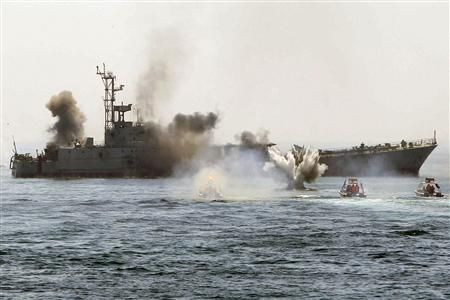Oil Price Jumps Over Iran Tensions; Global Markets Rise

Oil prices continued to rise Tuesday as concerns continue over Iran's threat to close the Strait of Hormuz, a vital passageway for oil tankers.
ICE February Brent crude futures rose $2.97 to $110.35 a barrel in trading, while U.S. crude futures were up $2.70 to $101.53 a barrel. U.S. crude futures were up as much as $101.68 in the trading day.
Oil ended 2011 up 13 percent as unrest in the Middle East became a steady beat near the end of the year.
Iran has threatened to close the Strait of Hormuz, though the U.S. has said it has a plan to fight back against such action. But military exercises in the region heightened concern in the New Year. Upset over threatened new sanctions on its crude exports from the U.S. due to the country's nuclear program, Iran recently conducted a military exercise firing three long-range missiles near the Strait of Hormuz, a gateway for some 40 percent of the world's oil delivery.
On Tuesday, Iranian state news agency IRNA quoted Iran's army chief Ataollah Salehi as saying the country will take action if a U.S. aircraft carrier returned to the gulf, according to Reuters. The carrier had reportedly left the area due to Iran's military exercises including the missile launch.
Iran will not repeat its warning, Salehi is quoted as saying.
The tensions, not expected to end anytime soon as posturing continues, is likely to keep oil markets in a jittery mode, said one expert.
The ever-growing frequency of intense sabre-rattling and muscle flexing between Iran and the US should keep the markets jittery and vulnerable to sudden price jumps, said JBC Energy, a Vienna based consultancy, according to Financial Times.
Meanwhile, global stock markets were generally up on Tuesday on positive economic news. New surveys show that growth in China and India is gaining momentum, pushing the markets up over lingering concerns with the European debt crisis.
The euro bounced back as well, trading 0.7 percent higher to $1.3041 after hitting a 15-month low at $1.2857 last week on concerns that the Eurozone crisis will consume Italy.
In Europe, Germany's DAX rose 1.2 percent to 6,146 and in the U.S. Wall Street was set to open higher as Dow futures rose 1.1 percent to 12,286. S&P futures climbed 0.6 percent to 1,259.
In France, the CAC-40 was 0.5 percent lower to 3,206, while Britain's FTSE 100 index was up 1 percent to 5,627.
© Copyright IBTimes 2025. All rights reserved.





















